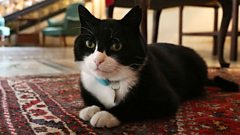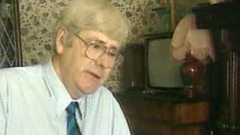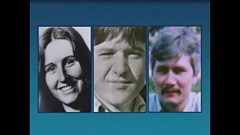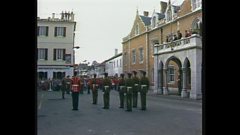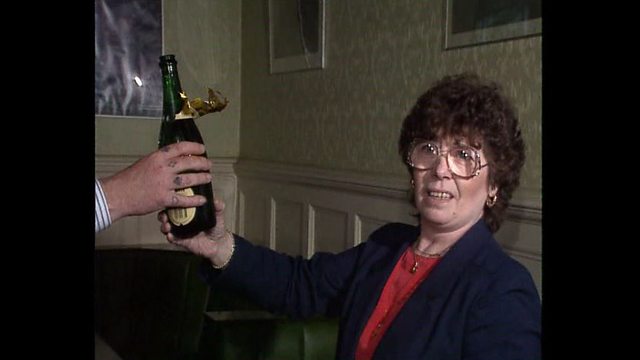
Maguire Seven’s convictions quashed
The Maguire Seven have won an appeal against their conviction (on 4 March 1976) for making the explosives used in the Guildford and Woolwich pub bombs.
Joshua Rozenberg’s report begins with a wide shot of the Maguire family crossing the road outside the Royal Courts of Justice.
Rozenberg informs us there was little doubt Anne Maguire and her family were going to be cleared by the Court of Appeal today; but the only ground of appeal allowed was the one conceded by the Crown.
In an experiment last year (1990), a leading forensic scientist (Professor Thorburn Burns) checked the original scientific tests used to convict the Maguire family of handling explosives. Professor Burns found that people could have traces of nitro-glycerine on their hands quite innocently.
That evidence was accepted by the court today; in effect the court was saying that somebody who dried their hands in the Maguires’ house had been handling explosives.
Mrs. Maguire, her family and supporters gather after the verdict. Amidst the popping of champagne corks Mrs. Maguire is not celebrating, “I lost 17 years of my family’s life.”
Outside the court Patrick Maguire, Anne’s son, is bitter that the Crown’s forensic scientists escaped with only mild criticism from the judges, “This is my country and it’s done this to me and to my family, that’s something I’ll have to live with. I just hope it never happens to anyone else.”
Chris Mullin MP, a supporter of the Maguires, feels the good name of the family has been smeared.
The report continues with archive footage of the aftermath of the Guildford pub bombs (on 5 October 1974).
Using old photographs as illustration, Rozenberg goes on to explain the relationships between Anne Maguire, her husband Paddy (Patrick), Paddy’s brother-in-law Giuseppe Conlon and Giuseppe’s son Gerry. It was Gerry Conlon (of the Guildford Four) who allegedly told police that Anne Maguire, his aunt, was the person who had shown him how to make bombs; this was why the police went to the Maguire’s house in the first place. It was also alleged by police that Paul Hill (another member of the Guildford Four) also identified Mrs. Maguire.
Rozenberg concludes his report by stating the Maguire family still stand accused of allowing someone into their house who had been in contact with explosives; they were cleared today only because there is no evidence to support that accusation.
CONTEXT
On 5 October 1974 the Provisional Irish Republican Army (PIRA) targeted Guildford, Surrey, because it was situated close to a number of garrison towns. The PIRA planted two six-pound gelignite bombs in two pubs. The first exploded just before 9.00pm in the Horse and Groom, destroying the front of the building and shattering the windows of neighbouring shops.
It killed Paul Craig, a plasterer (22 years old); two members of the Scots Guards, William Forsyth (18) and John Hunter (17); and two members of the Women’s Royal Army Corps, Caroline Jean Slater (18) and Ann Ray Hamilton (19). A further sixty-five persons were wounded.
After the first explosion, other public houses were evacuated, including the Seven Stars where the second bomb exploded at approximately 9.35 p.m. without causing any serious injuries.
On November 7 1974 Gunner Richard Dunne, a soldier (42) and Alan Horsley, a sales clerk (20) were killed when a PIRA bomb exploded in the King’s Arms in Woolwich. Twenty-six people, including five soldiers, were injured.
In December 1974 the police arrested three men and a woman: Gerry Conlon, Paul Hill, Patrick Armstrong and Carole Richardson. In October 1975 these four were convicted of the Guildford and Woolwich bombings and given life sentences. The group was known as the Guildford Four.
On 4 March 1976 the Maguire Seven were convicted of making the explosives used in these bombings. The Maguire Seven were: - Anne Maguire, Patrick Maguire (Anne’s husband), Patrick Maguire (son of Anne and Patrick), Vincent Maguire (son of Anne and Patrick), Sean Smyth (brother of Anne), Patrick O’Neill (family friend) and Giuseppe Conlon (brother-in-law of Anne Maguire and father of Gerry Conlon).
Over the years, the cases of the Guildford Four and the Maguire Seven came under increasing legal scrutiny and the range of those seeking a review of the convictions extended widely. On 17 October 1989 it was announced that corruption proceedings would be taken against the police involved in the conviction of the Guildford Four. Two days later, with the exception of Paul Hill, those convicted for the bombings were released. This followed an announcement by the Director of Public Prosecutions that it would be wrong for the Crown ‘to seek to sustain’ the convictions of 1975 on the basis of confessions that they had later retracted. The Court of Appeal had decided that the DPP in 1975 had suppressed scientific evidence which conflicted with the confessions. Paul Hill remained in custody because he was implicated in a case that had not yet been resolved. His conviction was eventually quashed in April 1994.
On 26 June 1991 the Court of Appeal overturned the sentences on the Maguire Seven. All of them had completed their sentences. Afterwards many criticised the court for dismissing most of the grounds of appeal and had simply concluded that the hands of the convicted could have been innocently contaminated with nitro-glycerine.
Duration:
This clip is from
More clips from 91�ȱ� Six O'Clock News
-
![]()
'He is not a European spy'
Duration: 01:42
-
![]()
Devastation in Omagh—17/08/1998
Duration: 01:53
-
![]()
Gibraltar victims named—07/03/1988
Duration: 01:16
-
![]()
Gibraltar's Changing of the Guard targeted—07/03/1988
Duration: 01:30

